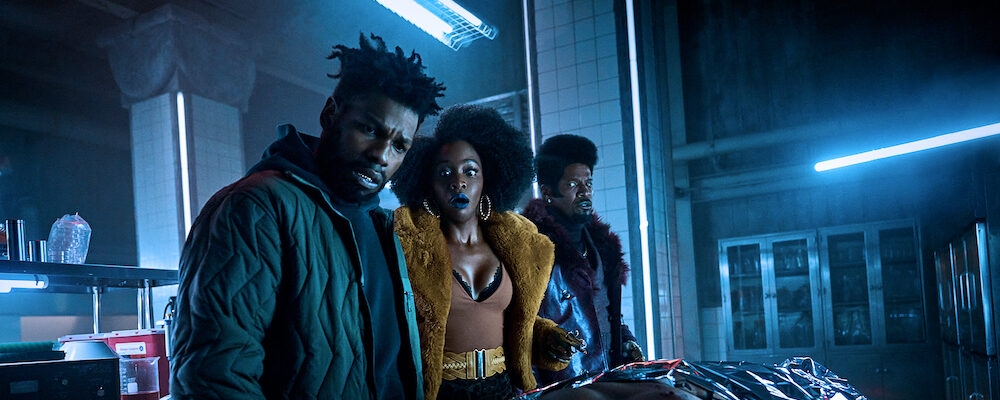‘They Cloned Tyrone’ Multiplies John Boyega for a Stylish Genre-Bending Satire
Alci Rengifo
Sometimes it takes a good grindhouse movie to get across real social commentary. Overly intellectualized material might lose the message, while a film like “They Cloned Tyrone” gets right to the point and entertainingly so. It’s about gentrification and how the elite want to force marginalized communities to conform to their ways, told as a funny yet eerie sci-fi parable in the style of early ’70s blaxploitation films. Here, director Juel Taylor confronts blaxploitation tropes while taking aim at the conspiracy theory culture currently obsessing America. These days it can seem as though there is something lurking in every corner, denying us the real knowledge behind any given event or headline. In a movie like this, the worst is confirmed with classic pulp paranoia.
The setting is a fictional Black American neighborhood known as “The Glen.” Drug dealer Fontaine (John Boyega) spends his days here hustling and carrying on an afternoon routine that involves buying a lottery ticket and a 40-ounce bottle of malt liquor, which he shares with a local homeless man before shaking down other dealers. Someone who owes Fontaine big is Slick Charles (Jamie Foxx), a pimp who oversees sex worker Yo-Yo (Teyonah Parris). After finding a nervous Slick Charles at a local motel, Fontaine gets gunned down by a dealer he rammed earlier in the day with his car. Strangely enough, Fontaine wakes up the next morning unscathed, to the utter shock of Slick Charles, who was sure he had seen Fontaine die. The two, along with Yo-Yo, go snooping for answers and find clues leading them to a trap house where they discover an elevator to an underground lab. How Fontaine resurrected now appears to be connected to a nefarious plan involving mysterious scientists and a cloning program.
“They Cloned Tyrone” plays like a hybrid of Jordan Peele’s “Get Out” and Robert Rodriguez’s “Planet Terror.” Taylor combines the surreal social commentary of the former with the B-movie spirit of the latter. Everything is exaggerated to just the right degree, including Jamie Foxx’s stylish pimp always brandishing a gold-plated pistol and the antics taking place in the underground lab. Every entertaining development in this movie links back to the key themes in the screenplay by Taylor and regular collaborator Tony Rettenmaier. The Glen is a satirical microcosm of working class Black America. A creepy billboard overlooks the neighborhood with a grinning white man saying, “Keep ’em smiling.” After Fontaine, Slick Charles and Yo-Yo investigate the lab they discovered, they soon realize the local fried chicken restaurant serves chicken laced with a strange powder which makes customers break into fits of sedated laughter. A local church with familiar scenes of ecstatic preaching and singing is also a front, serving a juice laced with this strange substance which can be traced back to the mysterious laboratory.
The overall idea is that unknown forces are targeting particular Black communities with plans for control and assimilation through cloning. Food, faith, music and beauty, which are features of daily life, are then used as tools to sedate and manipulate. It’s a grindhouse take on the notion that consumerism and religion are used to control populations. The story gets even wilder and keener when Fontaine and friends are confronted by the white man running the Glen operation, the appropriately named Nixon (Kiefer Sutherland). If certain communities will not assimilate to white culture willingly, then science will be bent to carry out the job, which explains the cloning program. In reality, gentrification is being seen more and more as a way to brush away cultures and histories of low-income communities and reshape them into neighborhoods for the privileged. This movie works like an “X-Files” episode where the paranoia isn’t necessarily off, even if the actual premise seems far-fetched. And, in the subtext is commentary on very real history of how systems have targeted Black communities through actions like the Tuskegee experiments.
These ideas come across in this feature that is also entertaining on a midnight movie level. Cinematographer Ken Seng gives “They Cloned Tyrone” the grainy, low-budget look of a ‘70s guilty pleasure. On the top corner you can even see the famous “cigarette burn” that signals a change in film reels. The soundtrack features songs like Diana Ross’ “Love Hangover,” which plays during scenes of our heroes discovering the experiments taking place at the nefarious headquarters. In the third act a mad scientist is revealed, who is also a blistering commentary on Black or minority self-hatred, when someone who feels compelled to turn against their own race over deep scars. All the roles are performed with much gusto, Jamie Foxx being the big scene stealer while John Boyega interprets a unique take on the film’s central character with tongue-in-cheek intelligence. Teyonah Parris is endearing as the sex worker who just wants to leave for Memphis to get away from a place where the future seems so dim.
“They Cloned Tyrone” works as a paranoid good time, but it also carries more importance than one might initially suspect. It contributes in many ways to an ongoing growth of Black American cinema that tackles challenging issues while proving it can be done so as slick entertainment. For years, especially since films like “Kill Bill” and “Grindhouse” popularized the genre all over again, directors have been trying to copy the purposefully cheap look of bygone B-flicks. Like Jordan Peele, Juel Taylor revisits the genre by elevating it with piercing social commentary. And, like Boots Riley’s “I’m a Virgo,” surreal imagery and action are covers for real ideas. Wouldn’t the ruling class just love to replace certain communities of people with lab-tested clones? The scheme uncovered by Fontaine is like a daydream out of Ron DeSantis’ brain. Dig deeper and it’s about plights faced by any marginalized group. “They Cloned Tyrone” hits the funny bone but leaves much for serious consideration.
“They Cloned Tyrone” begins streaming July 21 on Netflix.

